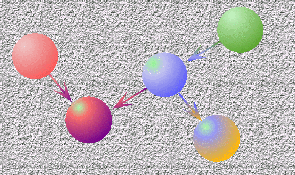




|
Fuzzy Data Analysis |

|
Neuro-Fuzzy Systems |


|

Neural Networks and Fuzzy Systems
Uncertainty and Vagueness
|

|


|
Data MiningIn cooperation with the data mining group of the research center Ulm of Daimler-Benz AG we work on methods for knowledge discovery in data bases. Currently our main issues are learning in probabilistic (Bayesian) and possibilistic inference networks, induction of decision trees, and determination of associative rules.The problem in learning inference networks is to decompose a multi-dimensional probability or possibility distribution in distributions on lower-dimensional spaces, which approximate the overall distribution as good as possible. For this task the software prototype INES (Induction of NEtwork Structures) was developed, which is based on the K2 algorithm by Cooper and Herskovits. Decision trees are a widely used method to classify objects due to their features. Decision trees are induced from sets of classified data. In classical methods, measures from probability or information theory are used to select relevant features. However, it is also possible to use possibility theory. We extended the well known decision tree learning algorithm C4.5 with possibilistic measures.
|

|
Data FusionWe participate in a working group of an IT programm sponsored by the European Community (May 1, 1996 until October 31, 1999). Our group works on the problem of combining conflicting and partially inconsistent information that comes from different sources of different reliability. In situtations where information is incomplete and imprecise, standard models of data fusion are not always sufficient. Therefore we also analyze approaches that are based on Shafer´s evidence theory (belief functions), on possibility theory, or on the theory on upper and lower probabilities.The aim of the working group is to examine differences and similarities of problems like data fusion, expert opinion pooling and sensor fusion, and then to analyze how the above mentioned approaches can be used to solve these problems. The results are going to be used to extend the theoretical foundations of data fusion, and to be included in industrial applications. The results are reported on semi-annual workshops. |

If you want to know more about our work please have a look at our list of our books , or choose a paper from our list of papers (with abstracts) and download it.
For further information please contact Rudolf Kruse or Christian Borgelt.
